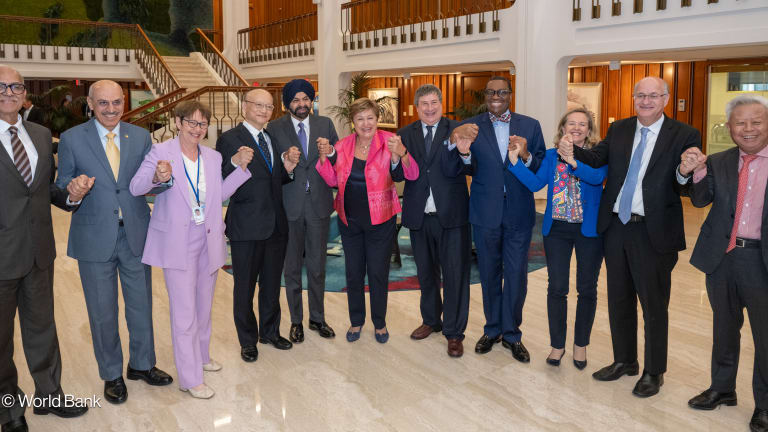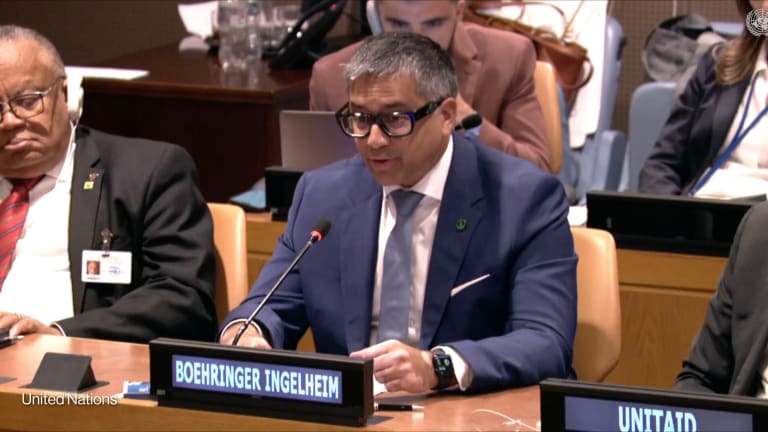
The United Nations’ 2021 High-Level Political Forum on Sustainable Development is in full swing. Yet for the second consecutive year, its effectiveness seems to be impacted by its virtual format. And the clock is ticking.
Yes, online meetings and side events have become more easily — and thus inclusively — accessible for a wide range of stakeholders, allowing anyone with a stable internet connection to attend. However, the core focus of the HLPF — following up and reviewing the 2030 Agenda for Sustainable Development — still seems to lack the actionable ambition it so direly needs.
Is it the lack of a buzzing New York, with attendees rushing from one side event to the other, that has killed the palpable HLPF urgency? Certainly, the repetitiveness of Zoom meetings and their many black screens — cameras off, microphones muted — does not help translate the acute need to deliver the Sustainable Development Goals. The COVID-19 pandemic has only brought us further away from the 2030 Agenda’s ambition to build a “just, equitable, tolerant, open and socially inclusive world in which the needs of the most vulnerable are met.”
Nonetheless, COVID-19 is also an inflection point for humanity, putting the global community toward the direction of radical change and transformative actions, which are exactly what we need to get on track for realizing the ambitions of the 2030 Agenda. To truly develop sustainably, we need to build differently and in a forward manner, not backward. Back is where we came from, and where we came from was not good enough.
Without continuous progress toward peace, justice, and inclusion at all levels, none of the SDGs can be delivered in full.
—SDG 16’s emphasis on peaceful, just, and inclusive societies has been recognized by stakeholders worldwide as a fundamental enabler of progress for the entire 2030 Agenda. For the interlinked complexities of today, we need a different system in which state and nonstate actors continuously interact to pursue the best way forward. Actors should work toward a renewed and more resilient social contract — one that actively includes and promotes nonstate actors in decision-making processes and policy implementation.
Yet the reality of today shows us noninclusive processes that lead to the preparation of one-sided voluntary national review reports — under the guise of COVID-19 restrictions impacting governments’ abilities to organize full-fledged consultation processes that can honestly and holistically review the 2030 Agenda’s true status.
As a critical enabler for all the other goals, SDG 16’s centrality has been underlined at this year’s HLPF in a newly launched addendum to the Rome Civil Society Declaration on SDG16+ — A Renewed Call for Strengthening Commitments, Partnerships, and Accelerated Action for SDG16+ — which has been endorsed by a significant number of organizations to date.
In this declaration, we — civil society — call upon stakeholders at all levels to inclusively and equally interact, decide, implement, and lead this transformative change. Inclusive governance enables and bolsters trust and social cohesion, allowing for the blossoming of well-informed solutions that benefit our society, economy, and environment.
Those often hit hardest — women, people of color, the LGBTQ community, and the world’s poorest — especially need to be not only heard, but meaningfully included in the necessary people-and-planet-centered approach toward a more sustainable world. We need to not only leave no one behind, but to reach those furthest behind first, with or without COVID-19.
Holding the HLPF virtually may have opened doors toward a more inclusive audience. What we need now, while we are edging toward a post-COVID-19 world, is to see that inclusivity manifested in reality — not only in our talks, but also in our actions.
This means clear choices and amplified commitments that are implemented — and not solely dreamed of in Zoom meetings or the U.N. General Assembly Hall. This means channeling funding toward inclusive processes, especially for local civil society often addressing challenges on the front line. This means also approaching one another in dialogue and truly collaborating — state to nonstate, South to North, sector to sector, and vice versa.
To facilitate the necessary transformative change of our current system, the global SDG16+ Community advocates for an annual thematic review of SDG 16. As institutions around the world are becoming ever more unresponsive or incapacitated in mitigating not only the pandemic, but also our global environmental, social, and economic crises, an annual review of SDG 16 is particularly crucial. The truth remains: Without continuous progress toward peace, justice, and inclusion at all levels, none of the SDGs can be delivered in full.
We need to partner locally and globally to institute fairer and more amplified efforts toward the SDG targets for peace, justice, and inclusion collectively known as SDG 16+. It is not enough to merely state a commitment to the implementation of SDG 16 on paper; a regular review of whether these commitments and pledges are indeed translated into meaningful action is essential.
So as we review SDG 16 for a second time, let us focus on truly inclusive processes worldwide. Let us build trust and equality in society. After all, warring, unjust, and excluding societies that demur on collaboration will not be able to make the 2030 Agenda a reality. Without true progress on the aspirations of SDG 16 and its inclusive governance, we will be left with sustainable setbacks alone — meaning no global health, no healthy planet, no green and fair economy, and no peace.
Therefore, from the world to the world: Let us make the virtual a reality. Civil society is acting on the front lines as first responders to any crisis. At the same time, civil society is calling for your support for and input in inclusive dialogue processes and collaborative actions.
Our door is already open. Let’s make it a multiway street and act on making the world the reality we need, together.










